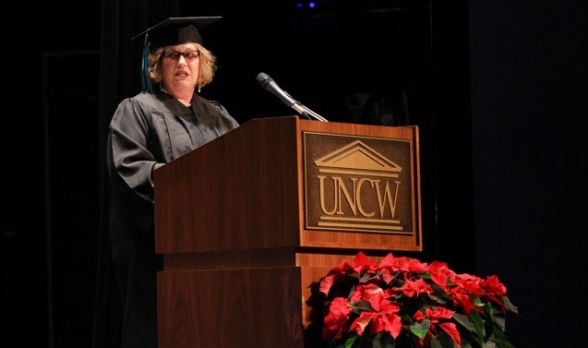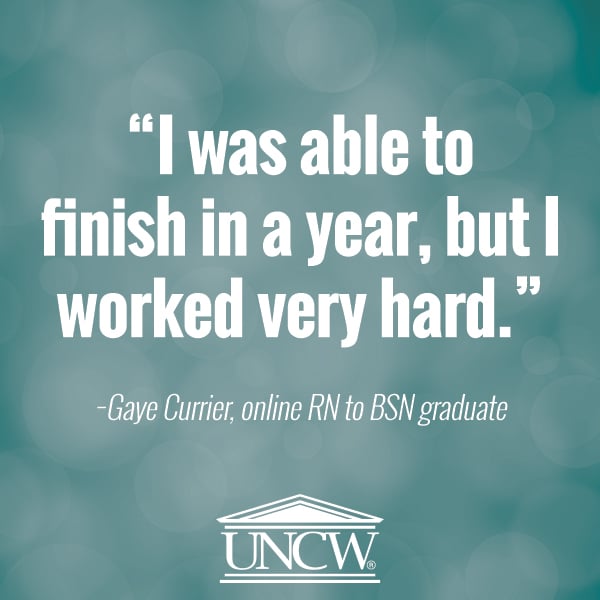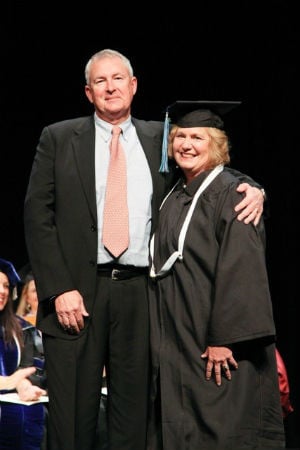Gaye Currier is not much for following conventional routes — not even when it comes to earning an RN to BSN.
“Even though I can retire right now if I want to, I just felt like if I did not have that BS in Nursing and I wanted to do any kind of consulting work, it would be almost impossible,” she said. “I just turned 60 years old, even though I might say I don’t look that old.”
She certainly has the energy of a person half her age.
Currier started working at Duke University Medical Center in 1995 after earning an Associate of Science Degree in Health Science from the Watts School of Nursing, which is in Durham, N.C. Twenty-one years later, she is a nurse program manager in sterile processing. Currier earned her sterile processing and distribution technician certification while she was working on her RN to BSN online at the University of North Carolina Wilmington.
“Almost all of my time has been in the operating room,” Currier said. “I’ve worked on the cardiac team, so I’ve done numerous transplants of all kinds. I’ve worked in general surgery and neurosurgery. I have been a nurse manager in cardiac. I have also been a clinical lead and a charge nurse. I’ve done it all. About a year ago was when I took a position as a program nurse manager in sterile processing.”
Switching Gears
Even though she always had a desire to join the medical field, Currier started her career as a teacher.
“After about 13 years of teaching, I had had enough,” she said. “I just could not shake wanting to go into the medical field.”
Currier earned a bachelor’s degree in education from Mississippi State University, where she played volleyball on scholarship. She got her athletic genes from her father, who is Baseball Hall of Famer Enos Slaughter — he spent 19 seasons in the majors with the Cardinals, Yankees, Athletics and Braves. Currier earned her master’s degree in education from the University of Tennessee and, 35 years later, her associate degree. Now she has completed the RN to BSN program at UNCW, taking perhaps the least conventional higher education route possible.
“I taught six years at the junior high level and six years at the high school level,” Currier said. “It was about the time that all of these end-of-course tests were coming about. I felt like they wanted you to teach the end-of-year tests instead of giving a student an all-around good education. I just felt like everything was geared toward that end-of-year test — and that just wasn’t me.”
She also had the luxury of making sure she could make the transition from teaching into healthcare.
“When you’re in education, you can take an educational leave,” Currier said. “That’s what I did. I took a year, so they basically held my position while I was going to school. After the first year of nursing school, I knew that I would be okay and that I would make it. So, then I resigned, finished my nursing education and took a job immediately.”
Never Too Late to Learn
Currier decided UNCW online would be the best option to add a BS in Nursing to her resume while she continued to work full-time.
“One of the biggest reasons was the quality of their program,” Currier said. “I had read online some good remarks about it, although I never knew anyone who actually went there.”
Because of her immense higher education experience, she was able to primarily focus on nursing courses in the online RN to BSN program.
“It was a good bit lighter course load,” Currier said. “I think psychology, chemistry and a foreign language were the only courses I had to take outside of the nursing program. I was able to finish in a year, but I worked very hard.”
Currier said two of her favorite courses were Bioethics [PAR 215] and Health Policy [NSG 404].
“What I like about it is it addresses a lot of issues that are current today, such as palliative medicine,” she said of Bioethics. “There’s a lot of talk about end-of-life care. There’s a couple of states that have the suicide assisted. I just feel like it really drilled down to issues that you hear about every day and people just don’t talk about because it has to do with death and dying. That was an excellent class.
“Another class I had that was excellent had to do with healthcare and hospital policy. That dealt with getting to know a lot of the issues that are in legislation right now that have to do with nursing and how it could change our lives.”
Lots of Support at Home
Currier said her husband, Bobby, was instrumental in helping her earn her bachelor’s degree in nursing.
“I could not have done it without him,” she said. “He helped me with some of my chemistry if I had a problem because he was a chemistry major at the University of North Carolina. He helped me out a lot there, but some of the classes required you to do examinations on patients and videotape them. Even though it’s online, there’s a lot of videotaping that goes on; you really need to know how to use the computer and technology.
“So, bless his heart — that’s a good Southern term — he, lots of times, would just stop everything and let me do an examination on him. Of course, lots of times we had to do it a couple of times because he would say something and make me laugh.”
In addition to having a support system at home, Currier said time management and organization are keys to earning an online degree.
“It helps to be detail-oriented and stay on schedule,” she said. “You need to have time to study every day. You need to not procrastinate and put things off until the last minute. You need to stay focused and pay attention to details.
“I had a daily planner, and there were things that needed to be done. I would know I would have certain assignments that were due Wednesday, so I would do those and get them out of the way, and then work on other assignments that were due later in the week. But you would have to be organized and stay on top of your assignments.”
And you could even decide to get a second bachelor’s degree as you’re closing in on retirement and walk the stage, like Currier did in December 2016.
“Absolutely,” she said, prior to the big day. “I may be the oldest person there.”
Learn more about the UNCW online RN to BSN program.


